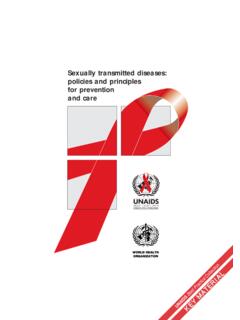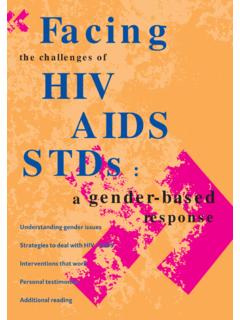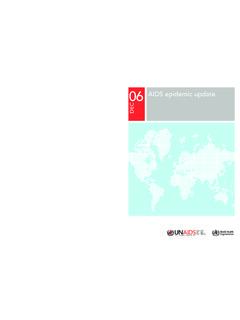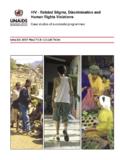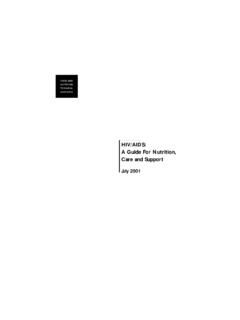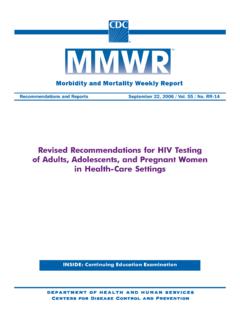Transcription of HIV/AIDS Care and Support in the Workplace
1 HIV/AIDS . care and Support in the Workplace Employers' Handbook on Managing HIV/AIDS in the Workplace Book Thailand Business Coalition on aids (TBCA). Employers' Confederation of Thailand (ECOT). International Labour Office (ILO). Supported by Joint United Nations Programme on HIV/AIDS (UNAIDS). HIV/AIDS . care and Support in the Workplace Thailand Business Coalition on aids (TBCA). Employers' Confederation of Thailand (ECOT). International Labour Office (ILO). Supported by Joint United Nations Programme on HIV/AIDS (UNAIDS). Copyright c International Labour Organization 2003. First published 2003. Publications of the International Labour Office enjoy copyright under Protocol 2 of the Universal Copyright Convention.
2 Nevertheless, short excerpts from them may be reproduced without authorization, on condition that the source is indicated. For rights of reproduction or translation, application should be made to the Publications Bureau (Rights and Permissions), International Labour Office, CH-1211 Geneva 22, Switzerland. The International Labour Office welcomes such applications. Libraries, institutions and other users registered in the United Kingdom with the Copyright Licensing Agency, 90 Tottenham Court Road, London W1T 4LP [Fax: (+44) (0)20 7631 5500; email: in the United States with the Copyright Clearance Center, 222 Rosewood Drive, Danvers, MA 01923.]
3 [Fax: (+1) (978) 750 4470; email: or in other countries with associated Reproduction Rights Organizations, may make photocopies in accordance with the licences issued to them for this purpose. Thailand Business Coalition on aids , Employers' Confederation of Thailand, International Labour Office Employers' Handbook on Managing HIV/AIDS in the Workplace Bangkok, International Labour Office, 2003. ISBN 92-2-114041-5. Thai edition: Employers' Handbook on Managing HIV/AIDS in the Workplace ISBN 92-2-814041-0, Bangkok 2003. The designations employed in ILO publications, which are in conformity with United Nations practice, and the presentation of material therein do not imply the expression of any opinion whatsoever on the part of the International Labour Office concerning the legal status of any country, area or territory or of its authorities, or concerning the delimitation of its frontiers.]
4 The responsibility for opinions expressed in signed articles, studies and other contributions rests solely with their authors, and publication does not constitute an endorsement by the International Labour Office of the opinions expressed in them. Reference to names of firms and commercial products and processes does not imply their endorsement by the International Labour Office, and any failure to mention a particular firm, commercial product or process is not a sign of disapproval. For information on how to obtain this publication, please write to the ILO Regional Office for Asia and the Pacific, 11th Floor, United Nations Building, Rajdamnern Nok Avenue, Bangkok 10200, Thailand [Fax: +66 2 280 1735, 288 3062; E-mail: Catalogues and lists of recent and forthcoming ILO books are available free of charge from the same address.]
5 ILO publications can also be obtained through major booksellers or ILO local offices in many countries, or direct from ILO Publications, International Labour Office, CH-1211 Geneva 22, Switzerland. Catalogues or lists of new publications are available free of charge from the above address, or by email: Visit our website: Printed in Thailand Page 1. Workplace care and Support 2-3. 2. What to do when an employee tells you they have HIV/AIDS 3. 3. Responding to destructive rumours 4-5. 4. HIV-positive employees should read this first 5-6. 5. Monitoring progress of HIV infection: 6-7. CD4 count and viral load test Booklet 3: HIV/AIDS care and Support in the Workplace HIV/AIDS .
6 care and Support in the Workplace HIV/AIDS care and Support in the Workplace 1. Providing Workplace care and Support helps to ensure that employees with HIV/AIDS remain healthy and productive at work. In addition, care and Support programmes can boost workforce morale by showing that the company is truly concerned about the health and well-being of its employees. Costs need not be high. Many companies have their own health services in place which can, with a little training, offer counselling and care in relation to HIV/AIDS . Costs can be further reduced by collaborating with community health centres, hospitals and specialized NGOs, including self-help groups of people with HIV/AIDS .
7 Booklet 4, care and Support Contacts, provides contact information for many of these organizations. Depending on your company's needs, a care and Support programme could include the following: - Creating a supportive Workplace environment, where discrimination is not tolerated and where working conditions are flexible enough to allow workers with HIV/AIDS to remain employed and productive;. - Referral to clinics providing voluntary, confidential counselling and testing;. - Treatment for sexually transmitted diseases (which in turn reduces the risk of HIV infection);. - Prophylaxis and treatment for opportunistic infections related to HIV/AIDS .
8 - Antiretroviral therapy to help people with HIV/AIDS to stay healthy. (This should only be provided if the company knows it can be maintained in the long term.); and - Employee and family assistance programmes. One person within the human resources department or management team should be assigned as a focal point for addressing the Workplace needs of employees with HIV/AIDS . HIV/AIDS care and Support 2 in the Workplace 1. Workplace care and Support Changes to work duties and conditions Every individual's needs for Workplace care and All employees with HIV/AIDS will at some point Support are different. The following guidelines and need some appropriate changes to their work principles should help in deciding what care and duties and conditions in order that they can keep Support to provide: working productively.
9 Depending on the needs of the HIV-positive employee and the company, the 1. Listen to the employee. Negotiate care and following could be considered as part of the care Support with them and do not dictate! and Support package: 2. Do not treat employees with HIV/AIDS . differently from other employees with a serious Flexibility in the work schedule, including time illness or condition, in terms of employment off for healthcare/counselling appointments;. and promotion, medical benefits and changes Reassigning the employee to a less stressful to their work duties and conditions; position, with tasks that suit their changing 3. Create an open, supportive atmosphere capabilities.
10 Between employees and management; Providing short-term and/or long-term leave 4. Ensure that care and Support do not draw with full or partial pay;. attention to the employee with HIV/AIDS and Creating more part-time positions;. lead to resentment or abuse from co-workers; Moving from commission-based to 5. Hold HIV-positive employees accountable for compensatory salary; and their assigned work duties. Do not lower your Allowing employees to work from home. professional expectations just because the employee is HIV-positive. Providing care and Employee and family assistance Support does not mean having to employ unproductive staff; An employee with HIV/AIDS will have many 6.
